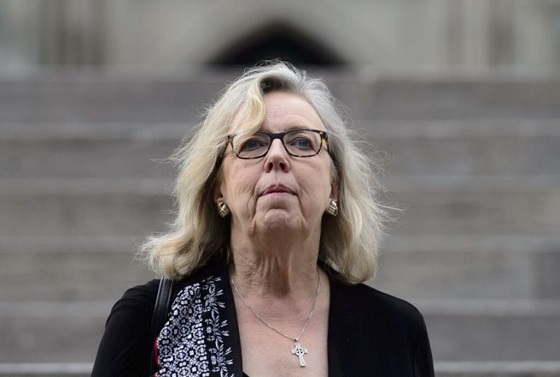Health
UK report debunks claim that halting puberty blockers increases suicide in gender-confused youth

From LifeSiteNews
For more than a decade, the transgender movement has used a potent lie to blackmail desperate parents and feckless politicians into accepting their agenda: that if gender-confused children are not provided with sex changes – “gender-affirming care” – they will be at a high risk for suicide. Parent after parent heard the simple, deceitful question, posed to them by trans activist medical professionals: “Would you rather have a dead daughter, or a live son?”
Yet another review highlights that this claim is completely baseless. As the BBC reported on July 20: “There is no evidence of a large rise in suicides in young patients attending a gender identity clinic in London, an independent review has found.”
The report, titled “Review of suicides and gender dysphoria at the Tavistock and Portman NHS Foundation Trust: independent report,” was published by the U.K. government on July 19. Professor Louis Appleby was tasked by Health Secretary Wes Streeting to examine the evidence after LGBT activists claimed that suicide rates were spiking due to restrictions on puberty blockers, which were first implemented in 2020. The review concluded:
- The data do not support the claim that there has been a large rise in suicide in young gender dysphoria patients at the Tavistock.
- The way that this issue has been discussed on social media has been insensitive, distressing and dangerous, and goes against guidance on safe reporting of suicide.
- The claims that have been placed in the public domain do not meet basic standards for statistical evidence.
- There is a need to move away from the perception that puberty-blocking drugs are the main marker of non-judgemental acceptance in this area of health care.
- We need to ensure high quality data in which everyone has confidence, as the basis of improved safety for this at risk group of young people.
This review is devastating to virtually every single claim trans activists have been making – and Appleby even notes, in point two of his summary, that trans activists themselves are posing a real danger to gender-confused children with their irresponsible lies about suicidality. Suicide, as we have long known, is a social contagion – and trans activists are explicitly encouraging gender-confused children to claim suicidal ideation in order to acquire puberty blockers.
As the BBC reported: “The Department of Health and Social Care (DHSC) said it was vital that public discussion around the issue was handled responsibly.” It is difficult to read that statement as anything but a direct rebuke of trans activists. Appleby, a professor of psychiatry and experienced suicide researcher from the University of Manchester, warned that trans activist rhetoric could actually lead to adolescents copycatting that behavior. “One risk is that young people and their families will be terrified by predictions of suicide as inevitable without puberty blockers – some of the responses on social media show this,” he said. As the BBC noted:
In response to [trans activist] claims, the new health secretary launched an independent review led by Prof Appleby which analysed data from NHS England on suicides of patients at the Tavistock clinic, based on an audit at the trust.
Covering the period between 2018-19 and 2023-24, he found there were 12 suicides – five in the three years leading up to 2020-21 and seven in the three years afterwards.
‘This is essentially no difference,’ Prof Appleby says in his report, ‘taking account of expected fluctuations in small numbers, and would not reach statistical significance.’
He adds: ‘In the under 18s specifically, there were 3 suicides before and 3 after 2020-21.’
The Good Law Project, run by executive director Jo Maugham, is currently challenging the puberty blocker ban – and predictably, Maugham expressed his disagreement with the review, saying that he had “profound difficulties” with it. It likely will make little difference. In the U.K., the transgender narrative is in tatters – and leaders still parroting these debunked lines should take note.
Focal Points
Pharma Bombshell: President Trump Orders Complete Childhood Vaccine Schedule Review

After unnecessary hepatitis B vaccine dropped for 3.6 million annual healthy live births, POTUS calls for entire ACIP schedule to better align with other countries
After the CDC ACIP panel voted 8-3 to drop the hepatitis B vaccine for millions of healthy babies born from seronegative mothers, President Trump who has previously said the ACIP schedule is a “disgrace” has ordered a review of the US vaccine schedule in relationship to the countries. Alter AI assisted in this review.
Based on the 2025 immunization schedules published by health authorities worldwide — including the CDC/ACIP (U.S.), Public Health England/UKHSA, Health Canada, Australia’s Department of Health, and the EU’s national public health programs — there are significant differences in how intensively children are vaccinated from birth to age 18.
Although all developed countries recommend broadly similar vaccines (targeting diphtheria, measles, polio, etc.), the United States stands at the top in total injections and doses, followed by Canada, France/Germany, the UK, Australia, Sweden, and Japan.
 United States — Approx. 30–32 vaccine doses (counts combination products as single dose) before age 18
United States — Approx. 30–32 vaccine doses (counts combination products as single dose) before age 18
The 2025 CDC/ACIP schedule (see CDC PDF schedule, 2025) remains the most aggressive among Western nations.
By age one, a typical American baby receives 20+ doses spanning nine diseases (Hepatitis B, Rotavirus, DTaP, Hib, Pneumococcal, Polio, COVID‑19, Influenza, RSV). By age two, 32 individual antigens including monoclonal antibodies have been received in utero and after birth.
By age six, most children have accumulated around 27 to 29 doses, and around 30–32 total doses by age 18 (including HPV, meningococcal, Tdap boosters, annual flu shots, and now COVID boosters). Doses include combination products, so the number of antigens is much greater approximately 72-93 depending on maternal injections and other factors.
The U.S. uniquely begins vaccination at birth with Hepatitis B (now restricted to ~25,000 seropositive/carrier mothers) and adds multiple annual vaccines regardless of local exposure risk. It also promotes simultaneous injection of up to six vaccines at once (“combination vaccines” or same-visit stacking), magnifying early childhood exposure to adjuvants and preservatives.
 Canada — ≈ 25–28 doses
Canada — ≈ 25–28 doses
Canada’s national and provincial schedules (see Health Canada) mirror the U.S., but some provinces delay or skip optional vaccines (like flu or COVID‑19 for healthy children). Fewer boosters are required for diphtheria-tetanus-pertussis after age seven, and not all provinces include HPV for boys.
Canada therefore averages 2–4 fewer total doses than the United States.
 France /
France /  Germany — ≈ 22–25 doses
Germany — ≈ 22–25 doses
European Union countries vary widely:
- France mandates 11 childhood vaccines (including Hep B and Hib), but does not recommend early COVID‑19 or influenza vaccination for all children.
- Germany (STIKO guidelines) offers a schedule very similar to the U.S. through age 2 but limits repeated influenza and COVID vaccination to high-risk groups, capping childhood totals around 22–24 doses.
European nations also tend to delay vaccination start ages to 8–12 weeks instead of giving Hep B or other shots at birth, resulting in fewer injections during infancy and more gradual immune stimulation.
 United Kingdom — ≈ 20–21 doses
United Kingdom — ≈ 20–21 doses
The UK’s NHS and UKHSA recommend a smaller, slower schedule than North America’s. Infants receive about 16–18 doses by age 5, increasing to 20–21 by age 18.
Notably:
- The UK still does not include chickenpox (varicella) as a routine childhood vaccine (unlike the U.S.).
- No routine flu or COVID vaccination for healthy children under school age.
- Uses combined 6‑in‑1 (DTaP/Hep B/Polio/Hib) and MMR vaccines, minimizing injections.
 Australia — ≈ 20 doses
Australia — ≈ 20 doses
Australia’s National Immunisation Program (NIP) mirrors the UK more closely than the U.S.
Infants start at 6–8 weeks, not at birth (Hep B exception). Only one influenza vaccine per year is recommended, and chickenpox is given later. No universal COVID vaccine for healthy under‑5s.
Total injections: about 20 by adulthood.
 Sweden /
Sweden /  Norway — ≈ 16–18 doses
Norway — ≈ 16–18 doses
Nordic countries follow some of the world’s most minimalist Western schedules:
- No routine chickenpox, no birth shots, no annual flu or COVID for healthy kids.
- Combined vaccines reduce needle count.
- Emphasis on fewer but spaced doses (e.g., 3‑dose DTaP schedule instead of 5).
Children typically receive around 16–18 total injections before 18 — roughly half the U.S. burden — without suffering higher rates of “vaccine‑preventable” illness, challenging the dogma that more vaccines equal better outcomes.
 Japan — ≈ 14–16 doses
Japan — ≈ 14–16 doses
Historically the most cautious industrialized nation, Japan delayed and later reduced its vaccine schedule after serious adverse events in the 1990s.
Although it now recommends many standard vaccines, lower frequency, single-antigen use, and minimal early‑life stacking mean the total doses remain lowest in the developed world, around 14–16 through adolescence.
Japan’s infant mortality and autism rates are lower than in the U.S., prompting renewed scientific interest in whether slower schedules might lower iatrogenic risk.
 Summary — Total Vaccine Doses (Ages 0–18 Years)
Summary — Total Vaccine Doses (Ages 0–18 Years)
Rank Country Approx. cumulative doses Notes on schedule intensity 1  United States 30–32 Most intensive; starts at birth; annual flu + COVID 2
United States 30–32 Most intensive; starts at birth; annual flu + COVID 2  Canada 25–28 Slightly milder than U.S.; fewer mandatory boosters 3
Canada 25–28 Slightly milder than U.S.; fewer mandatory boosters 3  France /
France /  Germany 22–25 Similar core vaccines; delayed start; selective flu use 4
Germany 22–25 Similar core vaccines; delayed start; selective flu use 4  United Kingdom 20–21 No varicella or universal flu/COVID; efficient combinations 5
United Kingdom 20–21 No varicella or universal flu/COVID; efficient combinations 5  Australia ≈ 20 Spaced schedule; limited COVID coverage 6
Australia ≈ 20 Spaced schedule; limited COVID coverage 6  Sweden /
Sweden /  Norway 16–18 Simplified; no birth or seasonal routine vaccines 7
Norway 16–18 Simplified; no birth or seasonal routine vaccines 7  Japan 14–16 Most delayed; minimal birth and combination doses
Japan 14–16 Most delayed; minimal birth and combination doses
 Interpretation
Interpretation
The data show a clear gradient: the United States vaccinates children more frequently and at earlier ages than any other Western nation, often stacking combinations before immune maturity. Nations with slower, smaller schedules — Sweden and Japan most notably — maintain equal or superior child health metrics, casting doubt on the premise that maximal dosing guarantees better outcomes.
The U.S. model prioritizes population‑wide compliance and theoretical herd immunity, while Europe and Japan incorporate a more individualized risk‑based approach. Given the expanding scientific literature on rising childhood allergic and neuropsychiatric illnesses, these cross‑national differences underscore the need for independent, transparent studies comparing long‑term health outcomes by cumulative vaccine burden — something major regulatory agencies have conspicuously avoided.
FOCAL POINTS (Courageous Discourse) is a reader-supported publication.
To receive new posts and support my work, consider becoming a free or paid subscriber.
Please subscribe to FOCAL POINTS as a paying ($5 monthly) or founder member so we can continue to bring you the truth.
Peter A. McCullough, MD, MPH
Daily Caller
Trump Orders Review Of Why U.S. Childhood Vaccination Schedule Has More Shots Than Peer Countries


From the Daily Caller News Foundation
By Emily Kopp
President Donald Trump will direct his top health officials to conduct a systematic review of the childhood vaccinations schedule by reviewing those of other high-income countries and update domestic recommendations if the schedules abroad appear superior, according to a memorandum obtained by the Daily Caller News Foundation.
“In January 2025, the United States recommended vaccinating all children for 18 diseases, including COVID-19, making our country a high outlier in the number of vaccinations recommended for all children,” the memo will state. “Study is warranted to ensure that Americans are receiving the best, scientifically-supported medical advice in the world.”
Trump directs the secretary of the Health and Human Services (HHS) and the director of the Centers for Disease Control and Prevention to adopt best practices from other countries if deemed more medically sound. The memo cites the contrast between the U.S., which recommends vaccination for 18 diseases, and Denmark, which recommends vaccinations for 10 diseases; Japan, which recommends vaccinations for 14 diseases; and Germany, which recommends vaccinations for 15 diseases.
Dear Readers:
As a nonprofit, we are dependent on the generosity of our readers.
Please consider making a small donation of any amount here.
Thank you!
HHS Secretary Robert F. Kennedy Jr. has long been a critic of the U.S. childhood vaccination schedule.
The Trump Administration ended the blanket recommendation for all children to get annual COVID-19 vaccine boosters in perpetuity. Food and Drug Administration (FDA) Commissioner Marty Makary and Chief Medical Officer Vinay Prasad announced in May that the agency would not approve new COVID booster shots for children and healthy non-elderly adults without clinical trials demonstrating the benefit. On Friday, Prasad told his staff at the Center for Biologics Evaluation and Research that a review by career staff traced the deaths of 10 children to the COVID vaccine, announced new changes to vaccine regulation, and asked for “introspection.”
Trump’s memo follows a two-day meeting of vaccine advisors to the Centers for Disease Control and Prevention in which the committee adopted changes to U.S. policy on Hepatitis B vaccination that bring the country’s policy in alignment with 24 peer nations.

Total vaccines in January 2025 before the change in COVID policy. Credit: ACIP
The meeting included a presentation by FDA Center for Drug Evaluation and Research Director Tracy Beth Høeg showing the discordance between the childhood vaccination schedule in the U.S. and those of other developed nations.
“Why are we so different from other developed nations, and is it ethically and scientifically justified?” Høeg asked. “We owe our children science-based recommendations here in the United States.”
-

 National16 hours ago
National16 hours agoMedia bound to pay the price for selling their freedom to (selectively) offend
-

 Bruce Dowbiggin15 hours ago
Bruce Dowbiggin15 hours agoSometimes An Ingrate Nation Pt. 2: The Great One Makes His Choice
-

 COVID-192 days ago
COVID-192 days agoUniversity of Colorado will pay $10 million to staff, students for trying to force them to take COVID shots
-

 Business2 days ago
Business2 days agoOil tanker traffic surges but spills stay at zero after Trans Mountain Expansion
-

 Energy2 days ago
Energy2 days agoELZABETH MAY HAS IT WRONG: An Alberta to Prince Rupert Oil Pipeline Will Contribute to Greater Global Oil Tanker Safety
-

 National2 days ago
National2 days agoAlberta will use provincial laws to stop Canadian gov’t from trying to confiscate legal firearms
-

 Energy6 hours ago
Energy6 hours agoThe Trickster Politics of the Tanker Ban are Hiding a Much Bigger Reckoning for B.C.
-

 COVID-192 days ago
COVID-192 days agoCanadian legislator introduces bill to establish ‘Freedom Convoy Recognition Day’ as a holiday








